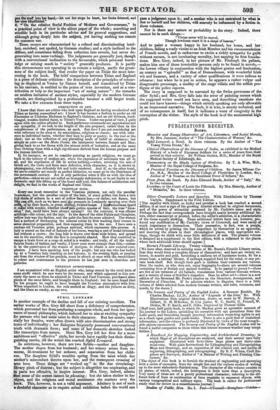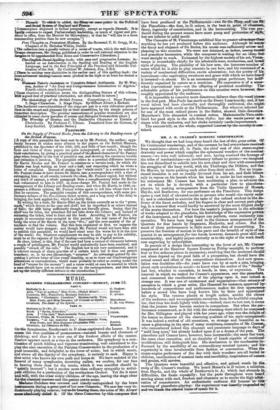PUBLICATIONS RECEIVED.
BOOKS.
Memoirs and Essays Illustrative of Art, Literature, and Social Morals., By Mrs. Jameson, Author of "The Characteristics of Women," &c. Sybil Lennard; a Novel. In three volumes. By the Author of " The Young Prima Donna," &c.
Clinical Illustrations of the Diseases of India, as exhibited in the Medical History. of a body of European Soldiers for a series of years from their arrival in that country. By William Geddes, M.D., Member of the Royal Medical Society of Edinburgh, &o.
Commentary on the Hindu System of Medicine. By T. A. Wise, M.D., Member of the Royal College of Surgeons, &c.
A Practical Treatise on the Diseases of Children. By James Milman Co- ley, M.A., Member of the Royal College of Physicians in London, &c.; Author of "A Treatise on the Remittent Fever of Infants," &c.
Prose from the South. By John Edmund Beade, Author of " Italy," &c. In two volumes.
Leontine; or the Court of Louis the Fifteenth. By Mrs. Moberly, Author of " Melanthe," &c. In three volumes.
Oliver Cromwell's Letters and Speeches. With Elucidations by Thomas Carlyle. Supplement to the First Edition. [The rapidity with which. so, bulky and peculiar a book has reached a second ,
edition, is at once a'sign of the growing interest attached to original documents, and of the power of attraction possessed by Mr. Carlyle's name and style.
Perhaps the fact that correspondents have brought nearly seventy additional let-
ters, either manuscript or printed, before the editor's attention, is a characteristic of the times equally striking. These additional letters have not, however, pro- duced any modification of Mr. Carlyle's views of. Cromwell, and were rarelyy of
mach importance in themselves. Their possession, in fact, was a puzzle, which he solved by printing the less important by themselves in an appendix, and inserting the others in their chronological places, with appropriate set- tinge, though we think with some little deficiency of zest. The present volume is designed as a supplement to the first edition, with a reference to the places where each additional letter should appear.] Burns's Fireside Library. Twenty volumes. [We have often observed in noticing some of Mr. Bas's Fireside Library series, that they would form a complete library of themselves; and here are twenty vo- lumes, in scarlet and gold, furnishing a uniform set of handsome books, fit for a steam-boat, a railway library, if railways supplied food for the mind, or any pri- vate book-shelf. But though their garb is uniform their contents are various. Does the reader, as who does not, enjoy biography?—there are several volumes. containing lives of British and ancient worthies. Is he partial to Poetry ?—there are five or six volumes of old ballads, translations from various German writers, and a version of some of Schiller's tragedies. Does he affect art?—there is a new edition of the Reverend Mr. Poole's treatise on the Structure, Arrangement, and Decoration of Churches. If he admires wisdom in disguise, there is a little volume of fables selected from modern German writers, and tales, romances, and novels, by the dozen.] The Scenery and Poetry of the English Lakes. A Summer Ramble. By Charles Mackay, LL.D., Author of "Legends of the Isles," &c. With Illustrations from original Sketches, drawn on wood by W. Harvey, J. Gilbert, D. H. M'Kewan, D. Cox junior, W. C. Smith, G. Fennell, W. Dick ,es W. P. Smith, and E. Gilks. Eneraved by Thomas Gilks. [Half tour, half guide-book, in which Dr. Mackay gives an agreeable account of his journey to the Lakes; sprinkling his narrative with apt quotations from the Lake poets, and furnishing enough practical information respecting sights to act as a check upon guides and guide-books. There is also a good deal of statistical information; and the volume is profusely illustrated by views of the most remark- able objects encountered. The Scenery and Poetry of the English Lakes will be ' found a useful companion to those whom this intense summer weather may tempt thither.] A Handbook for Mapping, Engineering, and Architectural Drawing; in which Maps of all descriptions are analyzed, and their several uses fully explained. Illustrated with forty-three large plates and thirty-nine
wood-cuts. With plain Instructions for Lithographing andZincographrng Maps and Drawings, and an exposition of the relative cost and merits of
engraving, lithographing, and zincographing. By B. P. Wilma, Civil En- gineer and Surveyor, Author of "A Manual of Writing and Printing Cha- racters," &c.
[The object of this book is to furnish the student of engineering and surveying with a series of examples, from the simple line and the various modes of writing up to the most elaborately-finished map. The character of the volume consists in its plates; of which, indeed, the letterpress is little more than a description. Very many of these are of a purely professional character; referring to the dif- ferent form of lines or combination of lines requisite to represent objects, with various topographical and military signs. The book is rather for professional study than for review iu a miscellaneous journal.]
Studies of Public Men. No. L Peel—O'Connell—Brougham—Cobden--
Tfisraelk To .is. addeel, Alt Eaaaron- sernepoints in the:Polltical:
anekflocial System:of, &gland and:France.
Commonplace disguised in formal pomposity, except as regards Disraeli. It is commend° exploit Parliamentary leadership, or much of vigour and pru- dence in office, froth the Member for Shrewsbury; or that he "will rise to a more commanding position than he now occupies."] Free Thoughts on Protestant.•Mattere. By the Reverend T. D. Gregg, M.A., Chaplain of St. Nicholas Within Dublin.
TUgecollectioninto a-goorily volume of a series-of' tracts, which the well-known olergyman, Mr. Gregg; published in order -to call national attention to the dangeneto be apprehended-from Romeand Conservative Liberalism.] The LEnsgiisit Bunal.Spelling-look, with easy-and progressive Lessons; in- tended as an. Introduction to the Spelling- and Reading of the English Language, and to the first Principles. of the Practical'and Scientific Cul- tivation orthe Soil: By Cuthbert W. Johnson, Esq., F.R.S. ['Thera ie nothing verrdistinetive is the earlier. part of this spelling-book the morwadvaseed readingeleasons, seem: pitched in too high or at least too formal a key.]:; WtitteWe Testor:s.AssisWeepor CompieteeSehvol Arithmetic. By :W. Wat- son, Author of "An Easy and.Comprehensive Introduction to Algebra"- Fourth edition, much improved.
[Great clearness of exhibition seems the distinguishing feature of this volume, with aegoodaleal of practical information-, not often foundin tutors:] The -Qui:neology- (1. the Britia Drama. Comprising-1. Stage Passions: 2. Stage Characters.: 3. Stage Plays, By:4alibert Abbott a Beckett. [The hacknied conventionalitiesor the stage are put in a very ridiculous point-of viesein this smart and pleasant hit at their absurdities, by the simple process of humorous description. The peculiar naannerismsof popular dramatists are also ridienled in some clever parodies of scenes and dtalogaes fromenodem.plays.] The Worship of Genius; and the Distinctive Character or Essence of Christianity. By Professor C. Ullman. Translated from the German, by Lucy Sanford. (Catholic-Series:)
PAMPREWIt
On the Supply of Printed Books from the Library to the Reading-room of thaBritssh Museum.
[A copy of' this pamphlet has been seat to-usiiy Panizzi, the author; appa- rently because he makes some allusion to the papers on the British Museum, published:in -the Spectator of the 16th, 23d, and 80th. of last month; though the facts and views of those papers are quite unimpugned; or rather, he confirms their-conclusions by giving a practical proof orthefinienicharaeterof the Panizzi plan when brought to the test of practical use, and showing the enormous trouble and irritation it invokes. The pamphlet refers- to a-personal difference between Sir Harris Nicolas and Mr. Pam= in mkt:bend° a- certain book, for which Sir Muria was kept waiting an hour and a halt; and respecting which he wrote a letter of complaint. Instead of stating the "whole truth" in a sentence or two, Mr.-Panizzi seems to have drawn Sir Harris into a-correspondence with a view of entrapping him: at all events; towards tile close, Mr. Panizzi copied, but without any mark of extract, a whole paragraph from a complimentary letter Sir Harris had, volunteered to him in 1837, on some-change Mr. Panizzi had made in the management of the Library and Reading-room; and when Sir Harris, in 1846, ex- presses-a different opinion, Mr. Panizzi writes again to tell him whose view it is that he censures. The pamphlet consists of this correspondence, with some pre- liminary defence of the fiVe-column ticket system, and a long story of the delay in bringing the book applied for; which is shortly this. In writing for a book, Sir Harris filled up the ticket correctly as to the "press- mark," which directs to the case and shelf; but he described it as octavo instead of folio; the title being sufficiently though not literally given. Seeing that the shelf was for folios, the attendant did not take down the volume; and instead of returning the ticket, tried to hunt out the booki According to Mr. Panizzi, six people in succession were -occupied in this pursuit; the real cause of the delay being the error of Sir Harris in the term "8vo.," and-the over-anxiety of the at tendants to find the volume. Had this been explained-at first, we suppose the matter would have dropped; and though Mr. Panizzi would not have been able to publish this pamphlet, he would have stood none the worse for it in the eyes of the world: for, whatever compliments we may be able tow to his subtlety, must be at the expense of his fair dealing—according to English notions. So clear indeed, is this, that if the case had been a contest of chicanery between a couple of pettifoggers, Mr. Panizzi would undoubtedly have been censured, and possibly "struck off the rolls." The English law is not very-sentimental, and it is tolerant enough of sharp practice of a certain kind; but it- does- not permit treachery, or, in its own phraseology, "surprise." An advantage gained by dis- gnising a private letter of nine yearn staading, so as to draw-out disadvantageous admissions or contradictions, would most probably.be.ruled as coming under the head of " snares for the unwary"; and a cause would at once be scouted in which a men should have put on record the-case in the correspondence, and-then have eet uptke totalIs'diMxent defence in the introduction.]



























 Previous page
Previous page